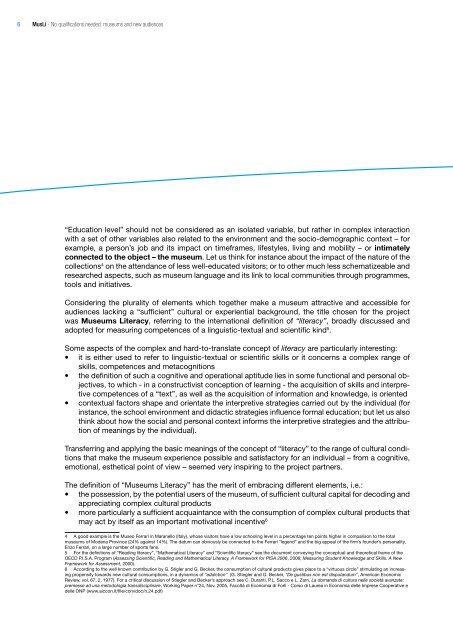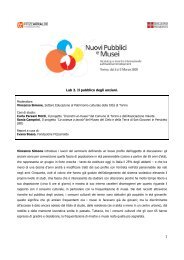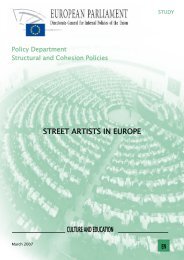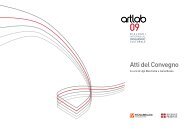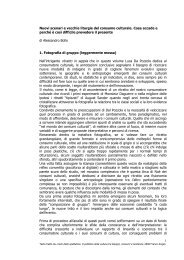MusLi (Museums Literacy) - Fondazione Fitzcarraldo
MusLi (Museums Literacy) - Fondazione Fitzcarraldo
MusLi (Museums Literacy) - Fondazione Fitzcarraldo
You also want an ePaper? Increase the reach of your titles
YUMPU automatically turns print PDFs into web optimized ePapers that Google loves.
6 <strong>MusLi</strong> - No qualifications needed: museums and new audiences<br />
“Education level” should not be considered as an isolated variable, but rather in complex interaction<br />
with a set of other variables also related to the environment and the socio-demographic context – for<br />
example, a person’s job and its impact on timeframes, lifestyles, living and mobility – or intimately<br />
connected to the object – the museum. Let us think for instance about the impact of the nature of the<br />
collections 4 on the attendance of less well-educated visitors; or to other much less schematizeable and<br />
researched aspects, such as museum language and its link to local communities through programmes,<br />
tools and initiatives.<br />
Considering the plurality of elements which together make a museum attractive and accessible for<br />
audiences lacking a “sufficient” cultural or experiential background, the title chosen for the project<br />
was <strong>Museums</strong> <strong>Literacy</strong>, referring to the international definition of “literacy”, broadly discussed and<br />
adopted for measuring competences of a linguistic-textual and scientific kind 5 .<br />
Some aspects of the complex and hard-to-translate concept of literacy are particularly interesting:<br />
• it is either used to refer to linguistic-textual or scientific skills or it concerns a complex range of<br />
skills, competences and metacognitions<br />
• the definition of such a cognitive and operational aptitude lies in some functional and personal objectives,<br />
to which - in a constructivist conception of learning - the acquisition of skills and interpretive<br />
competences of a “text”, as well as the acquisition of information and knowledge, is oriented<br />
• contextual factors shape and orientate the interpretive strategies carried out by the individual (for<br />
instance, the school environment and didactic strategies influence formal education; but let us also<br />
think about how the social and personal context informs the interpretive strategies and the attribution<br />
of meanings by the individual).<br />
Transferring and applying the basic meanings of the concept of “literacy” to the range of cultural conditions<br />
that make the museum experience possible and satisfactory for an individual – from a cognitive,<br />
emotional, esthetical point of view – seemed very inspiring to the project partners.<br />
The definition of “<strong>Museums</strong> <strong>Literacy</strong>” has the merit of embracing different elements, i.e.:<br />
• the possession, by the potential users of the museum, of sufficient cultural capital for decoding and<br />
appreciating complex cultural products<br />
• more particularly a sufficient acquaintance with the consumption of complex cultural products that<br />
may act by itself as an important motivational incentive6 4 A good example is the Museo Ferrari in Maranello (Italy), whose visitors have a low schooling level in a percentage ten points higher in comparison to the total<br />
museums of Modena Province (24% against 14%). The datum can obviously be connected to the Ferrari “legend” and the big appeal of the firm’s founder’s personality,<br />
Enzo Ferrari, on a large number of sports fans.<br />
5 For the definitions of “Reading literacy”, “Mathematical <strong>Literacy</strong>” and “Scientific literacy” see the document conveying the conceptual and theoretical frame of the<br />
OECD P.I.S.A. Program (Assessing Scientific, Reading and Mathematical <strong>Literacy</strong>. A Framework for PISA 2006, 2006; Measuring Student Knowledge and Skills. A New<br />
Framework for Assessment, 2000).<br />
6 According to the well known contribution by G. Stigler and G. Becker, the consumption of cultural products gives place to a “virtuous circle” stimulating an increasing<br />
propensity towards new cultural consumptions, in a dynamics of “addiction” (G. Stiegler and G. Becker, “De gustibus non est disputandum”, American Economic<br />
Review, vol. 67, 2, 1977). For a critical discussion of Stiegler and Becker’s approach see C. Duranti, P.L. Sacco e L. Zarri, La domanda di cultura nelle società avanzate:<br />
premesse ad una metodologia transdisciplinare, Working Paper n°24, Nov. 2005, Facoltà di Economia di Forlì - Corso di Laurea in Economia delle Imprese Cooperative e<br />
delle ONP (www.aiccon.it/file/convdoc/n.24.pdf)


